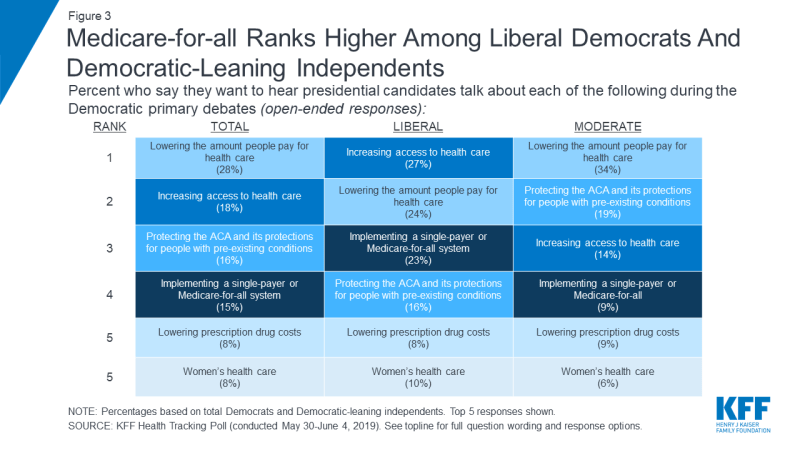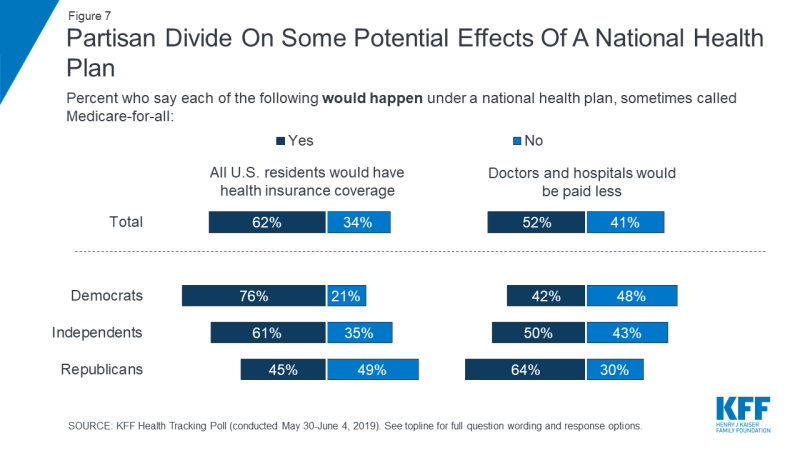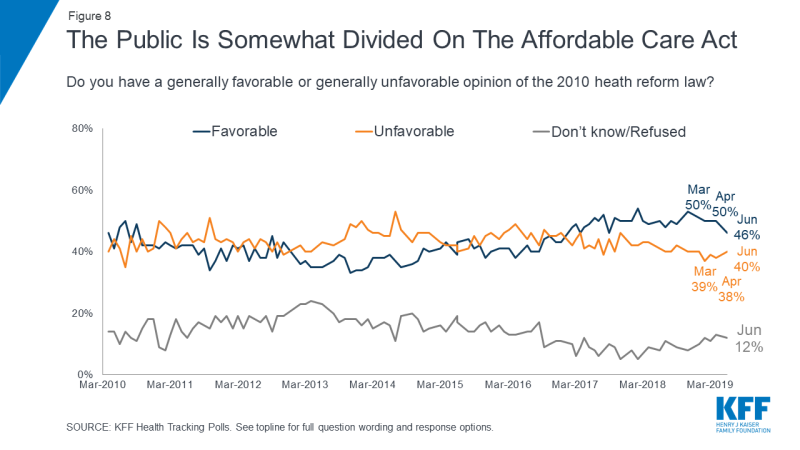KFF Health Tracking Poll - June 2019: Health Care in the Democratic Primary and Medicare-for-all
Key Findings:
- Health care is leading the list of possible topics Democrats and Democratic-leaning independents want to hear the 2020 Democratic presidential candidates talk about during their upcoming debates, with nearly nine in ten (87 percent) saying it is very important for candidates to talk about health care. This is closely followed by eight in ten who say it is very important for candidates to discuss issues affecting women, perhaps reflecting recent news attention on these issues. Health care and women’s issues rank ahead of other top issues for Democrats and Democratic-leaning independents such as climate change (73 percent), gun policy (72 percent), income inequality (70 percent), the economy (69 percent), and immigration (66 percent).
- When asked to say in their own words which health care issues they want to hear candidates discuss, affordability emerges as a top issue with nearly three in ten Democrats and Democratic-leaning independents mentioning lowering the amount people pay for health care (28 percent). A further eight percent mention lowering the cost of prescription drugs. Access to health care also emerges as a key topic with one in five mentioning increasing access to health care (18 percent) while an additional 15 percent explicitly mention implementing a single-payer or Medicare-for-all system.
- The most recent KFF Health Tracking Poll finds majorities across partisans think taxes for most people would increase under a national health plan, sometimes called Medicare-for-all (78 percent), and about half (53 percent) think private health insurance companies would no longer be the primary way Americans would get health coverage under such a plan. However, when it comes to other key changes that the leading Medicare-for-all bills introduced by Sen. Bernie Sanders and Rep. Pramila Jayapal would bring, large shares are unaware of how the current health care system may be affected. For example, majorities say people would continue to pay deductibles and co-pays (69 percent) and continue to pay premiums (54 percent) under a Medicare-for-all plan. Likewise, majorities say people with employer-sponsored or self-purchased insurance would be able to keep their plans (55 percent each) under a Medicare-for-all plan.
- Overall, nearly half of the public (46 percent) hold favorable views of the 2010 Affordable Care Act while four in ten hold unfavorable views. Majorities of Democrats continue to hold favorable views towards the law while majorities of Republicans hold unfavorable views. Independents are more divided with similar shares holding favorable and unfavorable views. To see the shifts in public attitudes towards the law over time, check out the KFF interactive.
Health Care in The Democratic Primary
Less than one month before the first 2020 Democratic presidential primary debate, KFF polling finds health care is among the top issues that Democrats and Democratic-leaning independents want to hear the candidates talk about during the upcoming debates. Nearly nine in ten Democrats and Democratic-leaning independents (87 percent) say it is “very important” for the candidates to talk about health care during the upcoming Democratic presidential debates. This is followed by eight in ten who say it is “very important” for the candidates to discuss issues that affect women, an issue that garnered recent media attention.
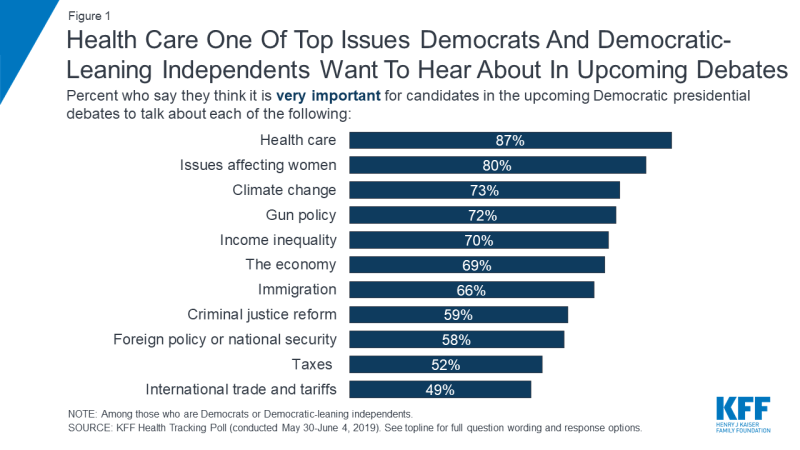
Figure 1: Health Care One Of Top Issues Democrats And Democratic-Leaning Independents Want To Hear About In Upcoming Debates
About seven in ten say it is “very important” for the candidates to discuss climate change (73 percent), gun policy (72 percent), income inequality (70 percent), the economy (69 percent), and immigration (66 percent). These are followed by criminal justice reform (59 percent), foreign policy or national security (58 percent), and about half say it is “very important” for the candidates to talk about taxes (52 percent) and international trade and tariffs (49 percent) in the upcoming Democratic debates.
When those who say health care is at least somewhat important for 2020 Democratic presidential candidates to discuss in upcoming debates are asked to offer in their own words what specifically about health care they want to hear about, nearly three in ten Democrats and Democratic-leaning independents overall offer responses related to lowering the amount people pay for health care (28 percent) and another eight percent explicitly mention lowering prescription drug costs. To learn more about Americans’ experiences with health care costs, check out this data note.
Access to health care also emerges as a key issue with one in five (18 percent) offering responses related to increasing access to health care and an additional 15 percent explicitly mentioning implementing a single-payer or Medicare-for-all system. The 2010 Affordable Care Act is also still on the minds of Democrats and Democratic-leaning independents with one in six mentioning protecting the Affordable Care Act and protections for people with pre-existing conditions (16 percent) as the top health care issue they want to hear about during the upcoming presidential debates. An additional one in ten (8 percent) offer access to reproductive health care services.
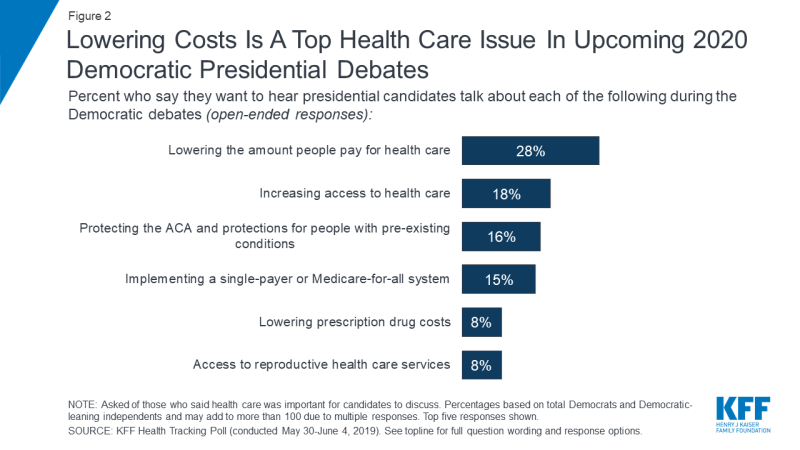
Figure 2: Lowering Costs Is A Top Health Care Issue In Upcoming 2020 Democratic Presidential Debates
Though lowering costs and increasing access emerge as the top issues that Democrats and Democratic-leaning independents want to hear presidential candidates talk about, there are some notable differences between liberals and moderates. One-fourth of liberal Democrats and Democratic-leaning independents (23 percent) offer implementing a single-payer or Medicare-for-all system when asked what health care issue they want to hear the candidates discuss, making it among the top health care issues offered by this group along with increasing access (27 percent) and lowering the amount people pay for health care (24 percent). Among moderate Democrats and Democratic-leaning independents, more than three times as many offer lowering the amount people pay for health care (34 percent) than implementing a Medicare-for-all system (9 percent).
Kaiser Family Foundation Focus Groups
During the spring of 2019, Kaiser Family Foundation conducted a series of 6 focus groups with a total of 56 participants in Texas, Florida, and Pennsylvania, examining voters’ top health care issues and their views of various national health care proposals. The groups included Republicans, Democrats, independents, seniors, and young adults, and found a disconnect between what the public is talking about when it comes to health care compared to the political discussions happening in Washington, D.C. and on the 2020 campaign trail. Read Drew Altman’s takeaways from the KFF focus groups here.
A National Health Plan or Medicare-for-all
Implementing a national health plan, sometimes called Medicare-for-all, has been a dominant issue during the 2020 Democratic primary. Previous KFF polling has found that a slight majority supports the idea of a national health plan, but attitudes towards such a proposal are fairly malleable with significant shares, on either side of the debate, shifting their opinion once they hear counter-arguments. With several bills being introduced in the 116th Congress that would expand the role of public programs in health, this month’s Kaiser Health Tracking Poll examines the public’s awareness on key aspects of Medicare-for-all plans including Sen. Sanders’ Medicare for All Act of 2019 and Rep. Japayal’s bill of the same name.1
Eight in ten (78 percent) think that under a national health plan, sometimes called Medicare-for-all, taxes for most people would increase. Majorities of Democrats (71 percent), independents (80 percent), and Republicans (85 percent) say that taxes for most Americans would increase under a national health plan.
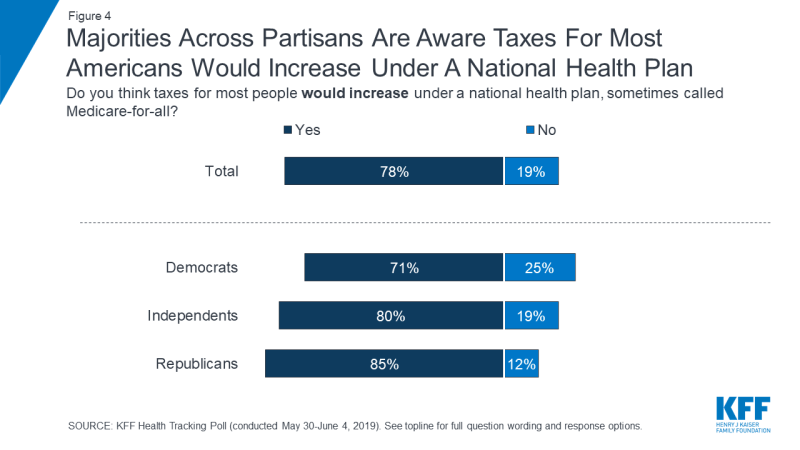
Figure 4: Majorities Across Partisans Are Aware Taxes For Most Americans Would Increase Under A National Health Plan
In addition, about half of Americans (53 percent) – including half of Democrats and independents (52 percent each) and most Republicans (57 percent) – think that under a national health plan, private health insurances would no longer be the primary way Americans would get health coverage. Still, a substantial four in ten of the public believe that under such a plan, private health insurance companies would still be the primary source of coverage for most Americans and an additional seven percent say they do not know what would happen under a national health plan.
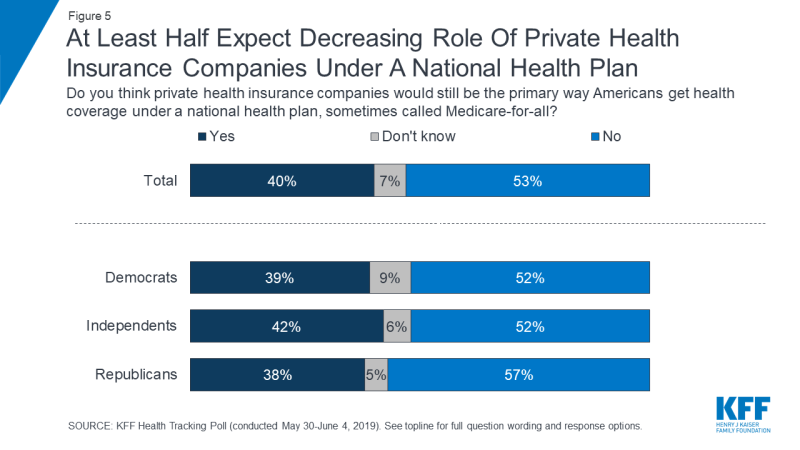
Figure 5: At Least Half Expect Decreasing Role Of Private Health Insurance Companies Under A National Health Plan
In focus groups, many participants expressed skepticism about the idea that private insurance companies would cease to exist under a Medicare-for-all plan. Some thought these companies were just too powerful, and others thought they would continue to exist for people who want to buy extra coverage beyond what a national plan would offer.
In their own words: Focus group participants on private insurance
[Moderator: Do you think Medicare-for-all means that private health insurance companies will go away?]
“No, because they’d be running Medicare-for-all.” (Houston, independent)
“Or even those individuals who can afford to have the type of coverage they want, they wouldn’t want a basic burger. No, they want to add all of the extra fixings because they can afford it.” (Houston, independent)
“They’re going to take a hit obviously but I don’t think that they’re really going to go away. They’re too powerful.” (Harrisburg, Democrat)
“I don’t think for a second that private insurance would go away, even if you implemented this. There will always be the Cadillac plan that is available, because as long as somebody—the market will react.” (Orlando, Democrat)
When it comes to other potential impacts of a national health plan, many Americans say most aspects of the current health care system would remain unchanged. Majorities of Democrats, independents, and Republicans say people would continue to pay deductibles and co-pays when they use health care services (71 percent, 68 percent, and 68 percent, respectively). In addition, majorities of both Democrats and independents also believe people with employer-sponsored insurance would be able to keep their current coverage (68 percent and 53 percent), people who purchase their own plans would be able to keep their current coverage (65 percent and 55 percent), and individuals and employers would continue to pay health insurance premiums (61 percent and 53 percent). At least four in ten Republicans also say each of these things would happen under a national health plan. Small shares of the public overall say they don’t know whether each of these things would happen under such a plan (4 percent say they don’t know if people would continue to pay deductibles and co-pays, 7 percent say they don’t know for the other changes included).
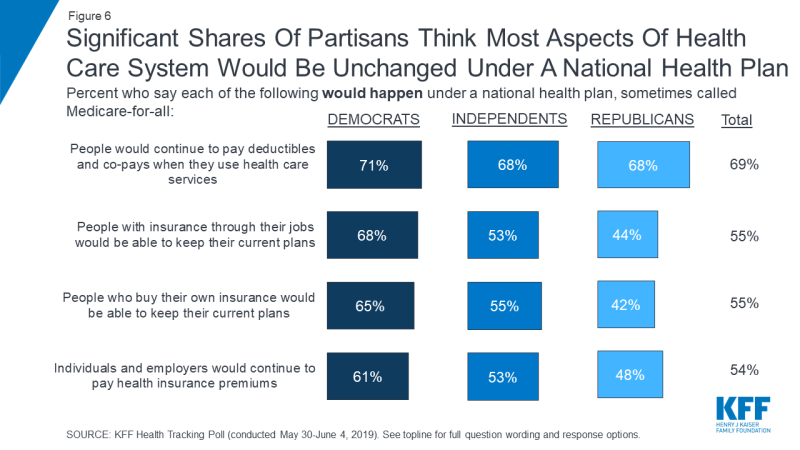
Figure 6: Significant Shares Of Partisans Think Most Aspects Of Health Care System Would Be Unchanged Under A National Health Plan
Focus group findings also indicate that many people don’t believe a Medicare-for-all plan would result in the elimination of health insurance premiums or cost-sharing.
In their own words: Focus group participants on premiums and cost-sharing
[Moderator: Do you think Medicare-for-all means that there would be no more co-pays or deductibles when people use care?]
“No, I think there’d probably still be co-pays and deductibles, but just be affordable.” (Houston, independent)
“It wouldn’t make sense to you that you wouldn’t have to pay [co-pays and deductibles] because it wouldn’t feel sustainable.” (Houston, independent)
“My mom is on Medicare and she has to pay co-pays.” (Houston, independent)
There is a partisan divide on some aspects of how a national health plan would affect people and health care providers. Three-fourths of Democrats (76 percent) say that all U.S. residents would have health insurance coverage under a national health plan while about half of Republicans say this would not happen (49 percent). On the other hand, most Republicans say a national health plan would lead to doctors and hospitals being paid less (64 percent) while about half of Democrats say this would not happen (48 percent). Large shares of independents believe both of these things would happen, with six in ten (61 percent) saying all U.S. residents would get health coverage and half saying doctors and hospitals would be paid less.
| Table 1: Partisans Disagree On Some Basic Implications of a National Health Plan | ||||
| Percent who think each of the following would happen under a national plan, sometimes called Medicare-for-all: | Total | Democrats | Independents | Republicans |
| Taxes for most people would increase | 78% | 71% | 80% | 85% |
| All U.S. residents would have health insurance coverage | 62 | 76 | 61 | 45 |
| Private health insurance companies would NOT be the primary way Americans get health coverage | 53 | 52 | 52 | 57 |
| Doctors and hospitals would be paid less | 52 | 42 | 50 | 64 |
| People who buy their own insurance would NOT be able to keep their current plans | 39 | 24 | 40 | 53 |
| Individuals and employers would NOT continue to pay health insurance premiums | 39 | 31 | 42 | 45 |
| People with employer-sponsored insurance would NOT be able to keep their current plans | 38 | 25 | 42 | 47 |
| People would NOT continue to pay deductibles and co-pays when they use health care services | 27 | 25 | 29 | 28 |
Public Views of The ACA
While the public still holds largely partisan views over the Affordable Care Act and opinions have remained relatively unchanged for the past two years since the Republican efforts to repeal the law, views are down slightly this month. Nearly half of the public (46 percent) hold favorable opinions of the ACA while four in ten hold a negative opinion of the law. Across partisans, nearly eight in ten Democrats (79 percent) have a favorable view of the ACA compared to nearly half of independents (47 percent), and about one-sixth of Republicans (16 percent).

